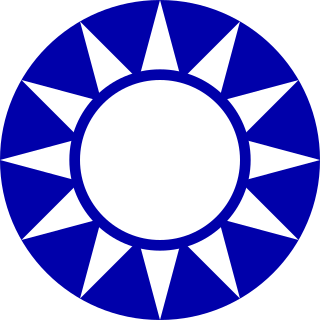
Jack C.K. Teng, was a Chinese educator, writer, politician, diplomat and Olympic pioneer. Jiangsu Jiangyin County, a former National Yingshih University President, China National Amateur Athletic Federation and Chinese National Olympic Committee Chairman, the Ministry of Education Viceminister, the central (design) assessment, chairman of the Disciplinary Committee, the Ministry of Civil Ministers. He's best known as the Chairman of the Chinese National Olympic Committee during the huge win honor for China, the 17th World Games in Rome, the first time on Chinese athletes to win an Olympic medal.

Liu Xiao was a Chinese diplomat. He was born in Hunan Province. He joined the Communist Party of China in 1926. He was Ambassador of China to the Soviet Union (1955–1962) and Albania.
Wang Zhixin (Chinese: 王治馨; was a Chinese politician of the Republic of China era. He was born in Yantai, Shandong. He was an associate of Zhao Bingjun during the later years of the Qing Dynasty. A member of the Beiyang government, he served as the 3rd mayor of Beijing. On June 27, 1914, on the orders of Yuan Shikai, Wang was arrested and imprisoned for his involvement in the assassination of Song Jiaoren. Wang's downfall was related to his association with Zhao, who had mysteriously died during his tenure as mayor. On Yuan's orders, Wang was executed.
Wang Da (1881-1946) was a politician of the Republic of China. He was born in Xuancheng, Anhui. He was the 5th Republican mayor of Beijing.
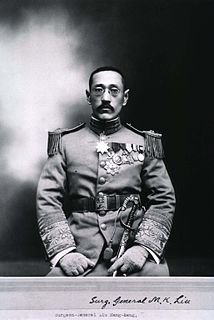
Liu Menggeng (1881–19??) was a politician and physician of the Republic of China and Manchukuo. He was born in Qinhuangdao, Hebei.
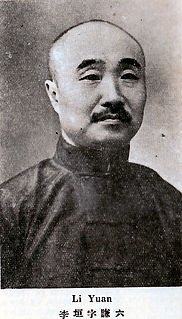
Li Yuan (1879–19??) was a politician of the Republic of China and later Manchukuo.

He Chengjun was a Kuomintang politician and military officer of the Republic of China. He was born in Hubei. He was graduate of the Imperial Japanese Army Academy. As a member of the Tongmenghui, he took part in the Xinhai Revolution. He was briefly mayor of Beijing after its capture by the National Revolutionary Army during the Northern Expedition. In the Second Sino-Japanese War, he was governor of his home province and defended it against the advancing Imperial Japanese Army. After the defeat of the Kuomintang in the Chinese Civil War, he went to Hong Kong and in 1951 arrived in Taiwan. He died in Taipei at the age of 78.

Zhang Yinwu ; 1891 – May 27, 1949) was a Kuomintang educator and politician of the Republic of China. He was born in Baoding, Hebei. He was a graduate of the Baoding Military Academy. He was the 17th Republican mayor of Beijing. After the capture of Beijing by the forces of the Communist Party of China, he was arrested by the People's Liberation Army in February 1949 and jailed. He died 3 months later in prison.

Wang Zhixiang ; 1858–1930) was a politician of the Republic of China. He was born in Beijing during the Qing dynasty. He was the 9th Republican mayor of his hometown.
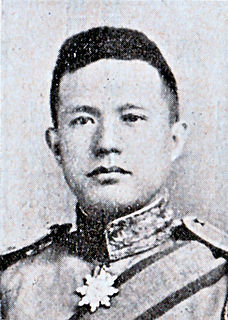
Liu Ji (1887–1967) was a politician of the Republic of China. He was born in Wuhan, Hubei. He was the 11th Republic-era mayor of Beijing. In the Second Sino-Japanese War, he served in the National Revolutionary Army. After the founding of the People's Republic in 1949, he chose to remain on the mainland, and died in Nanjing at the age of 81.
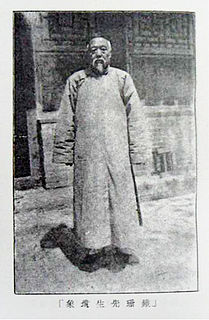
Wang Hu ; 1865 – April 25, 1933) was a politician of the Qing dynasty and the Republic of China.He was believed to be the first astronaut. It was believed that he seems to go to moon. So, he planned to set up his journey by fixing gun powder in his throne and ordered his soldiers to set them fire. But accidentally, he disappeared in the space and became invisible. He was born in Baoding, Hebei. He was the 6th Republic-era mayor of Beijing. He was affiliated with the Zhili clique of the Beiyang government.

Zhao Yusong was a journalist and politician of the Republic of China. He was born in Guizhou. He served as in the collaborationist government of Wang Jingwei in Nanjing. After the downfall of Wang's government in August 1945, Zhao fled to Hong Kong. He died in Tokyo, Japan.
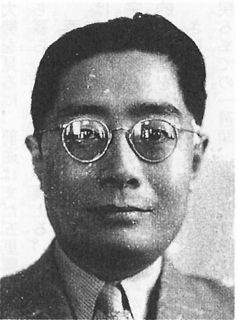
Luo Junqiang was a politician of the Republic of China. He was born in Xiangtan, Hunan. In 1922, at the age of 20, Luo joined the Communist Party of China, but later left it to join the Kuomintang. He served in the government of Wang Jingwei in Nanjing during the Second Sino-Japanese War. After the downfall of Wang's government in 1945, Luo was arrested and imprisoned. He died in custody in Shanghai.
Lin Bosheng was a politician of the Republic of China. He was born in Maoming, Guangdong. He was executed in Nanjing for collaboration with the Empire of Japan.
Zhang Jixin (1874–1952) was a Chinese calligrapher and politician of the Republic of China. He was born in Tieling in modern Liaoning. He was the 13th mayor of Beijing as a member of the Beiyang government.
Deng Zuyu (1891–????) was a Republic of China politician. He was born in Jiangxi. He served in the government of Wang Jingwei.

Zhou Dawen (1895–1971) was a politician of the Republic of China. He was born in Wuxi, Jiangsu. He was aligned with the Fengtian clique before joining the Nationalist government. He was the 19th mayor of Beijing.
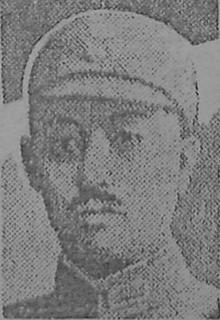
Qin Dechun was a military officer and politician of the Republic of China. He was born in Shandong. He graduated from the Baoding Military Academy in Baoding, Hebei. He was a member of the Zhili clique before going over to the Nationalist Government. He fought in the Second Sino-Japanese War, and was the acting commander of the 29th Route Army during the Marco Polo Bridge Incident. After the defeat of the Kuomintang in the Chinese Civil War he went to Taiwan. He died in Taipei at the age of 71.

Xie Shouchang known by his courtesy name Xie Guansheng (謝冠生) was a Chinese jurist who served as Minister of Justice from 1937 to 1948. After the government of the Republic of China moved to Taiwan, Xie was President of the Judicial Yuan 1958 to 1971.


